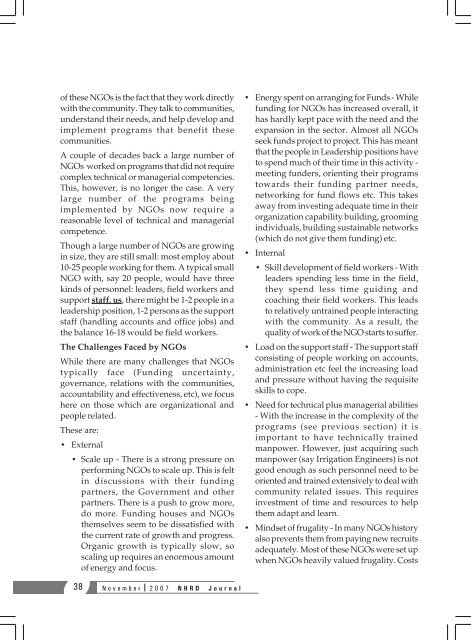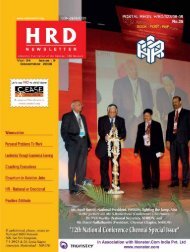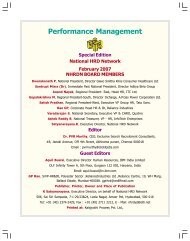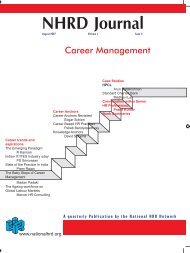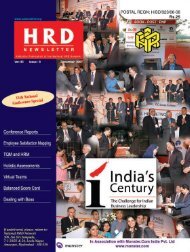NHRD Journal - National HRD Network
NHRD Journal - National HRD Network
NHRD Journal - National HRD Network
You also want an ePaper? Increase the reach of your titles
YUMPU automatically turns print PDFs into web optimized ePapers that Google loves.
of these NGOs is the fact that they work directly<br />
with the community. They talk to communities,<br />
understand their needs, and help develop and<br />
implement programs that benefit these<br />
communities.<br />
A couple of decades back a large number of<br />
NGOs worked on programs that did not require<br />
complex technical or managerial competencies.<br />
This, however, is no longer the case. A very<br />
large number of the programs being<br />
implemented by NGOs now require a<br />
reasonable level of technical and managerial<br />
competence.<br />
Though a large number of NGOs are growing<br />
in size, they are still small: most employ about<br />
10-25 people working for them. A typical small<br />
NGO with, say 20 people, would have three<br />
kinds of personnel: leaders, field workers and<br />
support staff. us, there might be 1-2 people in a<br />
leadership position, 1-2 persons as the support<br />
staff (handling accounts and office jobs) and<br />
the balance 16-18 would be field workers.<br />
The Challenges Faced by NGOs<br />
While there are many challenges that NGOs<br />
typically face (Funding uncertainty,<br />
governance, relations with the communities,<br />
accountability and effectiveness, etc), we focus<br />
here on those which are organizational and<br />
people related.<br />
These are:<br />
• External<br />
• Scale up - There is a strong pressure on<br />
performing NGOs to scale up. This is felt<br />
in discussions with their funding<br />
partners, the Government and other<br />
partners. There is a push to grow more,<br />
do more. Funding houses and NGOs<br />
themselves seem to be dissatisfied with<br />
the current rate of growth and progress.<br />
Organic growth is typically slow, so<br />
scaling up requires an enormous amount<br />
of energy and focus.<br />
• Energy spent on arranging for Funds - While<br />
funding for NGOs has increased overall, it<br />
has hardly kept pace with the need and the<br />
expansion in the sector. Almost all NGOs<br />
seek funds project to project. This has meant<br />
that the people in Leadership positions have<br />
to spend much of their time in this activity -<br />
meeting funders, orienting their programs<br />
towards their funding partner needs,<br />
networking for fund flows etc. This takes<br />
away from investing adequate time in their<br />
organization capability building, grooming<br />
individuals, building sustainable networks<br />
(which do not give them funding) etc.<br />
• Internal<br />
• Skill development of field workers - With<br />
leaders spending less time in the field,<br />
they spend less time guiding and<br />
coaching their field workers. This leads<br />
to relatively untrained people interacting<br />
with the community. As a result, the<br />
quality of work of the NGO starts to suffer.<br />
• Load on the support staff - The support staff<br />
consisting of people working on accounts,<br />
administration etc feel the increasing load<br />
and pressure without having the requisite<br />
skills to cope.<br />
• Need for technical plus managerial abilities<br />
- With the increase in the complexity of the<br />
programs (see previous section) it is<br />
important to have technically trained<br />
manpower. However, just acquiring such<br />
manpower (say Irrigation Engineers) is not<br />
good enough as such personnel need to be<br />
oriented and trained extensively to deal with<br />
community related issues. This requires<br />
investment of time and resources to help<br />
them adapt and learn.<br />
• Mindset of frugality - In many NGOs history<br />
also prevents them from paying new recruits<br />
adequately. Most of these NGOs were set up<br />
when NGOs heavily valued frugality. Costs<br />
38<br />
November 2007 <strong>N<strong>HRD</strong></strong> <strong>Journal</strong>


